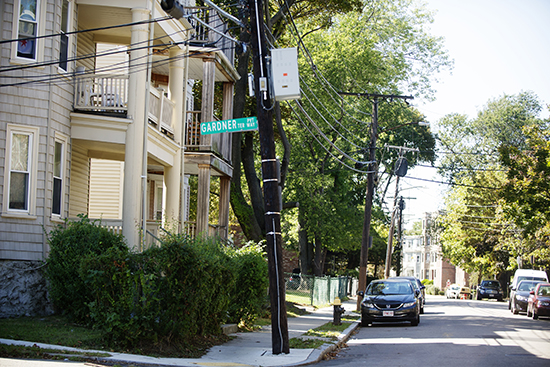Living Safely Off-Campus
Rules, regulations, rights student renters should know

BU students living off campus have a wealth of information resources available on their rights as renters. Photo by Jackie Ricciardi
An estimated 4,000 BU undergraduate and graduate students are living off campus, according to the University’s Off-Campus Services office, and many of them are first-time renters, with little knowledge of what kind of safety precautions landlords should provide or what they should do to stay safe. With the fall semester now in full swing, the University and the city of Boston are taking steps to make sure these students know their rights as renters and get the facts about how to make their apartment as safe as possible.
Within the BU community, the importance of safe living practices was driven home in April 2013, with a citywide dialogue spurred by the death of Binland Lee (CAS’13), a BU student who died from smoke inhalation after a fire ripped through an Allston apartment that according to the Boston Globe she shared with 13 others.
A year after Lee’s death, a Globe investigative series detailing the dangerously overcrowded conditions of many student-occupied dwellings compelled city officials to crack down on scofflaw landlords. And in August 2014, the Boston City Council passed the University Accountability Ordinance, requiring Boston colleges and universities to provide the city with addresses for all of their students living off campus. Last spring, in an effort to halt the illegal practice of renting off-campus housing to five or more undergraduate students, the city’s Inspectional Services Department examined hundreds of student apartments suspected of being overcrowded.
This year sees new, additional initiatives that state, city, and University officials hope will make off-campus life safer. Massachusetts Attorney General Maura Healey has released a Student Renters Guide that enumerates the various rights of renting students. Among those listed: “If the landlord refuses to make repairs, you have the right to a free inspection by a local health inspector.”
And last month, the mayor’s office launched Boston 311, a citywide digital platform for reporting nonemergency issues, including housing concerns. The hotline can be accessed 24 hours a day, 365 days a year by dialing 3-1-1, visiting the 311 website, and tweeting @BOS311, as well as through the free BOS:311 app.
William “Buddy” Christopher, Boston’s inspectional services commissioner, urges all students to download the app. Students, he stresses, have the right to clean, safe living spaces. That means proper locks should be on all outside doors, properly functioning smoke and carbon monoxide alarms should be installed outside all sleeping areas, heating systems should work, and pest and rodent control should be provided. Christopher reminds students that all living spaces are required to have at least two means of exit that do not require the use of a tool, such as a key, and that all apartment dwellers should always have an escape route planned and always keep doorways free of obstacles. He also tells all students to make sure they have a fire extinguisher within reach and that they avoid overloading electrical outlets and running outlets under rugs—two common causes of electrical fires.
“The mayor and our office want students to know that they shouldn’t have to worry about their living environments,” says Christopher. “Inspectional Services is here to help. We will never just throw a student out. If there is a problem, we will pursue the landlord vehemently.”
Kenneth Elmore, BU dean of students, also urges students to think hard about off-campus housing safety. “You have to manage a household and take responsibility, maybe for the first time,” says Elmore (SED’87). “It’s worthwhile taking a moment to think about the aspects of being in a leased space. Just take a moment to think about the space you’re in.”
Kim Santo (CAS’00, SED’00,’02), assistant director of judicial affairs and off-campus services, advises students to be particularly careful during and after parties. Often, she says, the real danger comes after parties have ended, with someone carelessly tossing a cigarette into a trash can or forgetting that a candle is still lit. “If you host a party,” she says, “volunteer to be the last person to bed, the one who does a full sweep of the house to make sure any and all candles, grills, and smoking materials are properly extinguished.” And be careful where you grill—Boston and Brookline prohibit the use of charcoal grills on wooden porches, and state law forbids the use or storage of gas grills anywhere inside or above the first floor of any residence.
As BU’s Environmental Health and Safety (EHS) website points out, candles are the leading cause of fires started by college students. That’s why they’re prohibited in on-campus residences, as are smoking materials and anything with an open flame. EHS recommends that students living off-campus avoid using candles entirely and heed the University’s rigorous fire safety plan. The Boston Fire Department also offers a list of home fire safety practices, including never using a gas stove or oven for heat, a practice that could lead to carbon monoxide poisoning.
Scott Paré, BU Police Department deputy chief and BU’s deputy director of public safety, points out that safety precautions do not begin and end within an off-campus apartment: the trek to campus can also present danger. “One of our biggest concerns is students traveling to and from their off-campus apartments,” he says. “We want to remind students to take their headphones off, put their phones away, and stay in well-lit areas. We know there are so many dark shortcuts they can take, but it’s best they stay in well-lit areas, stay on main roads like Comm Ave if they can.”
Mara Sassoon can be reached at msassoon@bu.edu.

Comments & Discussion
Boston University moderates comments to facilitate an informed, substantive, civil conversation. Abusive, profane, self-promotional, misleading, incoherent or off-topic comments will be rejected. Moderators are staffed during regular business hours (EST) and can only accept comments written in English. Statistics or facts must include a citation or a link to the citation.